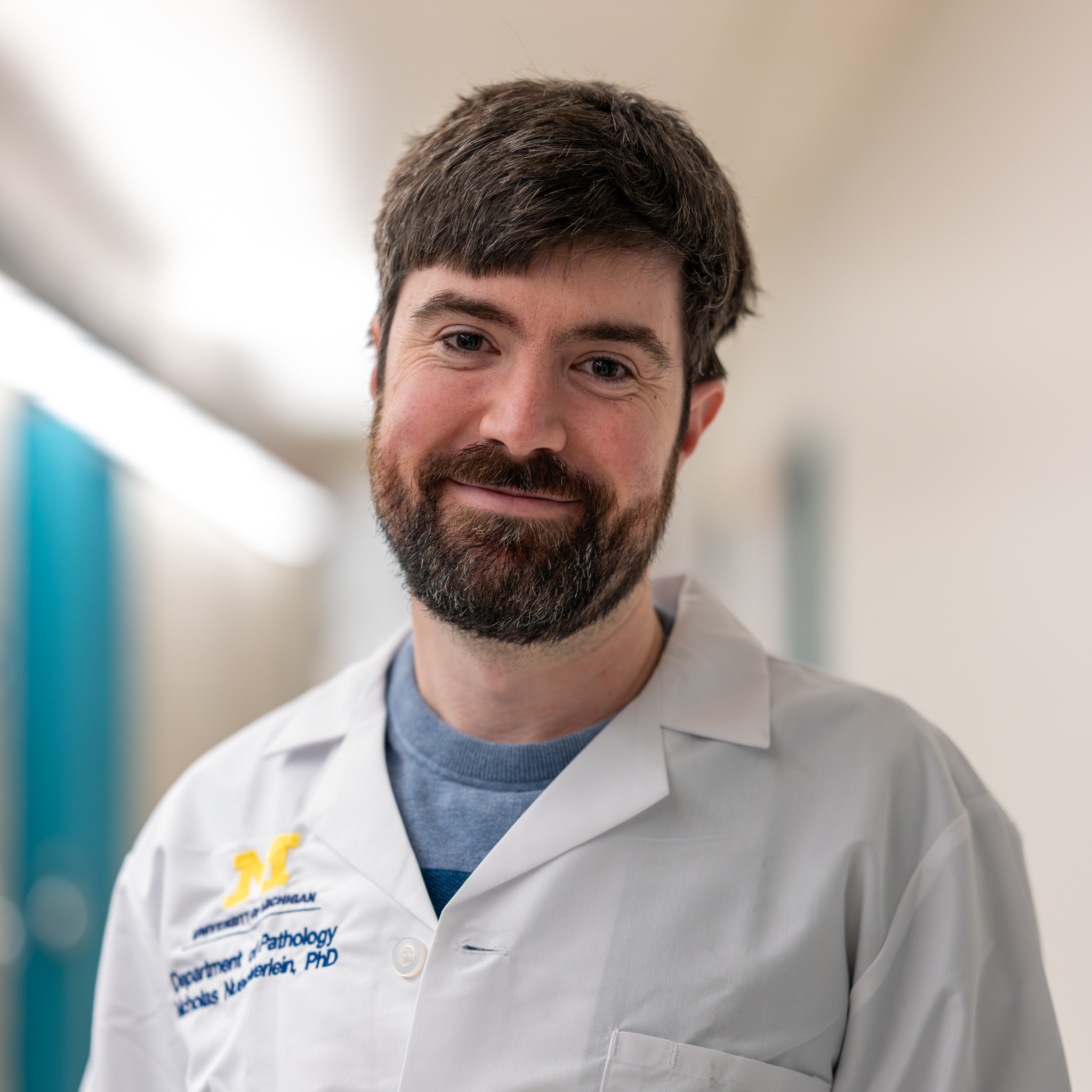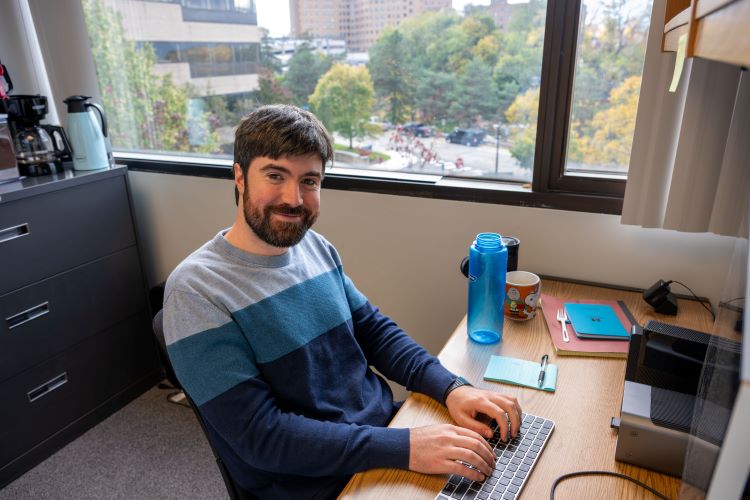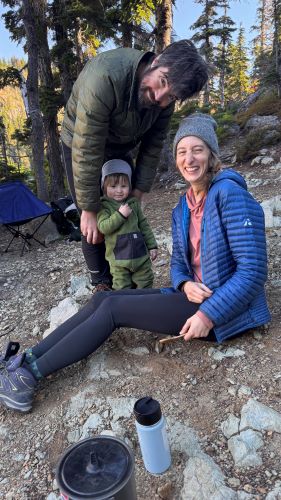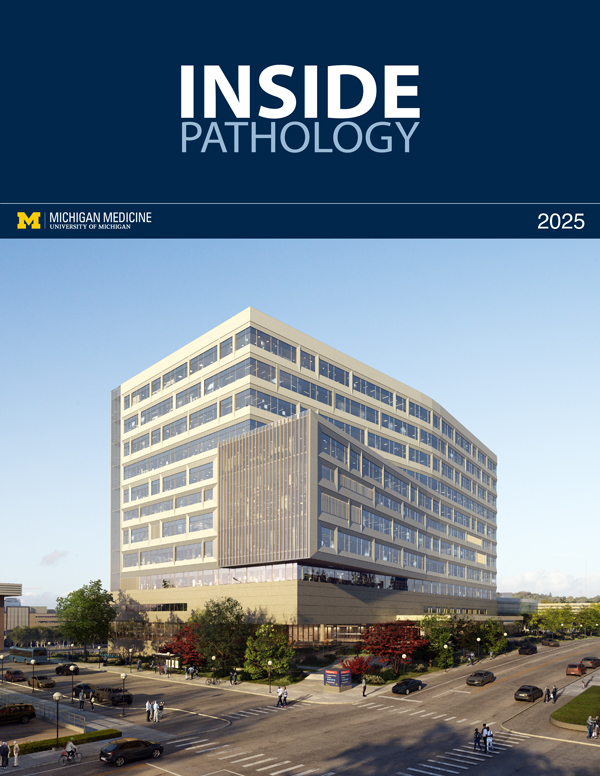

 Many people attend college and pursue a major, only to end up working in a field they never anticipated. Nicholas Nuechterlein, PhD, can relate to that situation. He pursued a double major in Mathematics and English Literature at the University of Michigan. However, toward the end of college, he had a personal experience with brain tumors, which redirected his path. “I wanted to get into this space, but I did not have a background in biology." At the time, computer-vision methods were rapidly evolving, and he thought emerging machine learning models may be able to make clinically relevant inferences from brain tumor MRIs, so he applied to computer science graduate programs.
Many people attend college and pursue a major, only to end up working in a field they never anticipated. Nicholas Nuechterlein, PhD, can relate to that situation. He pursued a double major in Mathematics and English Literature at the University of Michigan. However, toward the end of college, he had a personal experience with brain tumors, which redirected his path. “I wanted to get into this space, but I did not have a background in biology." At the time, computer-vision methods were rapidly evolving, and he thought emerging machine learning models may be able to make clinically relevant inferences from brain tumor MRIs, so he applied to computer science graduate programs.
Nuechterlein enrolled in a PhD program in computer science at the University of Washington. He then completed postdoctoral fellowships at the Fred Hutchinson Cancer Center in Seattle and at the NIH. During his training, he focused primarily on adult-type diffuse gliomas, including glioblastoma, IDH-mutant astrocytoma, and oligodendroglioma. He began with looking at MRIs, “but it became apparent that understanding the underlying biology of these diseases required focusing on the molecular level.” He contacted neuropathologists and started a transition from computer vision to bioinformatics.
During his postdoctoral work, he analyzed data to identify prognostic biomarkers, such as somatic copy number alterations, in glioblastoma. In a study he published in Genes and Development, he identified PDE10A loss as a novel, poor prognostic marker in glioblastoma and showed that its suppression activates PI3K/AKT/mTOR signaling independently of PTEN, driving tumor growth. Using mouse models and single-nucleus RNA-seq, he and his co-authors demonstrated that PDE10A loss induces a proneural-to-mesenchymal transition, characterized by altered cell adhesion and more aggressive histologic features. These findings suggest that PI3K and mTOR inhibitors may represent candidate therapies for tumors harboring PDE10A loss.
 About four weeks ago, Nuechterlein moved back to the University of Michigan as a Research Investigator in the Laboratory of Dr. Sriram Venneti. In this lab, he will be shifting his focus to diffuse midline gliomas (DMGs) and diffuse intrinsic pontine glioma (DIPG). These tumors are primarily diagnosed in children and occur in the lower brain, with few surgical options. This is a devastating cancer with no known treatment, although Venneti and close collaborator Dr. Carl Koschmann have a drug going through clinical trials that appears very promising.
About four weeks ago, Nuechterlein moved back to the University of Michigan as a Research Investigator in the Laboratory of Dr. Sriram Venneti. In this lab, he will be shifting his focus to diffuse midline gliomas (DMGs) and diffuse intrinsic pontine glioma (DIPG). These tumors are primarily diagnosed in children and occur in the lower brain, with few surgical options. This is a devastating cancer with no known treatment, although Venneti and close collaborator Dr. Carl Koschmann have a drug going through clinical trials that appears very promising.
“As I settle into my new space, I am looking forward to working with others as part of the scientific team. I have so much to learn from them.” He hopes to give lab members more time at the bench by taking over analyses of the immense amount of data they generate, and he also looks forward to mentoring others on bioinformatics to help them in their research projects. He is thankful for those who mentored him along the way and wants to repay their generosity. “Dr. Linda Shapiro was my computer science advisor at the University of Washington, Dr. Eric Holland at the Fred Hutchinson Cancer Center, and Dr. PJ Cimino at the NIH. Consistent, thoughtful mentorship is not to be taken for granted, and I am grateful – beyond grateful – that I received such care three times in a row.”
For those interested in pursuing a bioinformatics research career, Neuchterlien recommends gaining research experience before committing to a career in research. “Try to get the flavor of research; see what it feels like. Research is a different type of hard, a different type of rewarding, and, at times, carries its own, distinct kind of frustration. See if you like all that. Fundamentally, we are just trying to make people’s lives better. There are a lot of ways to do that, and research is just one. You will be the most effective, the happiest, and the healthiest when you enjoy your way of doing good in this world. So, try research out; try a lot of things out. You’ll find your way.”
 Nuechterlein is happy to be back in Ann Arbor, where he completed his undergrad. Although this time, he has a lovely home in NW Ann Arbor with his wife, Danielle, and baby boy, William, who just turned a year old. They are his primary sources of joy in his life. His wife works as a PA in primary care at Packard Health, a Federally Qualified Health Center, which serves an underserved patient population. “She’s the essential one. I write papers; she sees 20+ patients a day from all sorts of backgrounds with all sorts of concerns. She reminds me that medicine is only a part of healthcare – quality of life, housing access, transportation access, addiction, literacy, mobility, insurance, and acute fear of discrimination are things we don’t account for in our research. A Michigan study out of Dr. Karin Muraszko’s lab showed that DMG/DIPG patients from higher-income families live twice as long as those from lower-income families. We need new therapies, certainly. But there are also things patients need that we already have.”
Nuechterlein is happy to be back in Ann Arbor, where he completed his undergrad. Although this time, he has a lovely home in NW Ann Arbor with his wife, Danielle, and baby boy, William, who just turned a year old. They are his primary sources of joy in his life. His wife works as a PA in primary care at Packard Health, a Federally Qualified Health Center, which serves an underserved patient population. “She’s the essential one. I write papers; she sees 20+ patients a day from all sorts of backgrounds with all sorts of concerns. She reminds me that medicine is only a part of healthcare – quality of life, housing access, transportation access, addiction, literacy, mobility, insurance, and acute fear of discrimination are things we don’t account for in our research. A Michigan study out of Dr. Karin Muraszko’s lab showed that DMG/DIPG patients from higher-income families live twice as long as those from lower-income families. We need new therapies, certainly. But there are also things patients need that we already have.”
 Recently, Nuechterlein took up carpentry and built a chicken coop that is now home to six chickens of various breeds. “They are still young. We got our first egg last week. If we get too many, we’ll call the neighbors.” While living in Washington, he and Danielle passed weekends skiing in the backcountry. The landscape is different in Michigan -- different, but familiar, and full of wilderness, empty trails, and warm, fresh water. He is not quite sure where he will ski this winter in Michigan, but he might try to put a toddler on skis and introduce him to the bunny hill. For now, Nuechterlein is excited to be here, to collaborate, and to start independent projects. “I am most excited to work with the amazing people in the lab. There are some brilliant graduate students and postdocs, and I am looking forward to working with them.”
Recently, Nuechterlein took up carpentry and built a chicken coop that is now home to six chickens of various breeds. “They are still young. We got our first egg last week. If we get too many, we’ll call the neighbors.” While living in Washington, he and Danielle passed weekends skiing in the backcountry. The landscape is different in Michigan -- different, but familiar, and full of wilderness, empty trails, and warm, fresh water. He is not quite sure where he will ski this winter in Michigan, but he might try to put a toddler on skis and introduce him to the bunny hill. For now, Nuechterlein is excited to be here, to collaborate, and to start independent projects. “I am most excited to work with the amazing people in the lab. There are some brilliant graduate students and postdocs, and I am looking forward to working with them.”
Please join us in welcoming Dr. Nicholas Nuechterlein home to Michigan!
*********
Citation: Nuechterlein N, Shelbourn A, Szulzewsky F, Arora S, Casad M, Pattwell S, Merino-Galan L, Sulman E, Arowa S, Alvinez N, Jung M, Brown D, Tang K, Jackson S, Stoica S, Chittaboina P, Banasavadi-Siddegowda YK, Wirsching HG, Stella N, Shapiro L, Paddison P, Patel AP, Gilbert MR, Abdullaev Z, Aldape K, Pratt D, Holland EC, Cimino PJ. Haploinsufficiency of phosphodiesterase 10A activates PI3K/AKT signaling independent of PTEN to induce an aggressive glioma phenotype. Genes Dev. 2024 Apr 17;38(5-6):273-288. doi: 10.1101/gad.351350.123. PMID: 38589034; PMCID: PMC11065166.
 ON THE COVER
ON THE COVER
Breast team reviewing a patient's slide. (From left to right) Ghassan Allo, Fellow; Laura Walters, Clinical Lecturer; Celina Kleer, Professor. See Article 2014Department Chair |

newsletter
INSIDE PATHOLOGYAbout Our NewsletterInside Pathology is an newsletter published by the Chairman's Office to bring news and updates from inside the department's research and to become familiar with those leading it. It is our hope that those who read it will enjoy hearing about those new and familiar, and perhaps help in furthering our research. CONTENTS
|
 ON THE COVER
ON THE COVER
Autopsy Technician draws blood while working in the Wayne County morgue. See Article 2016Department Chair |

newsletter
INSIDE PATHOLOGYAbout Our NewsletterInside Pathology is an newsletter published by the Chairman's Office to bring news and updates from inside the department's research and to become familiar with those leading it. It is our hope that those who read it will enjoy hearing about those new and familiar, and perhaps help in furthering our research. CONTENTS
|
 ON THE COVER
ON THE COVER
Dr. Sriram Venneti, MD, PhD and Postdoctoral Fellow, Chan Chung, PhD investigate pediatric brain cancer. See Article 2017Department Chair |

newsletter
INSIDE PATHOLOGYAbout Our NewsletterInside Pathology is an newsletter published by the Chairman's Office to bring news and updates from inside the department's research and to become familiar with those leading it. It is our hope that those who read it will enjoy hearing about those new and familiar, and perhaps help in furthering our research. CONTENTS
|
 ON THE COVER
ON THE COVER
Director of the Neuropathology Fellowship, Dr. Sandra Camelo-Piragua serves on the Patient and Family Advisory Council. 2018Department Chair |

newsletter
INSIDE PATHOLOGYAbout Our NewsletterInside Pathology is an newsletter published by the Chairman's Office to bring news and updates from inside the department's research and to become familiar with those leading it. It is our hope that those who read it will enjoy hearing about those new and familiar, and perhaps help in furthering our research. CONTENTS
|
 ON THE COVER
ON THE COVER
Residents Ashley Bradt (left) and William Perry work at a multi-headed scope in our new facility. 2019Department Chair |

newsletter
INSIDE PATHOLOGYAbout Our NewsletterInside Pathology is an newsletter published by the Chairman's Office to bring news and updates from inside the department's research and to become familiar with those leading it. It is our hope that those who read it will enjoy hearing about those new and familiar, and perhaps help in furthering our research. CONTENTS
|
 ON THE COVER
ON THE COVER
Dr. Kristine Konopka (right) instructing residents while using a multi-headed microscope. 2020Department Chair |

newsletter
INSIDE PATHOLOGYAbout Our NewsletterInside Pathology is an newsletter published by the Chairman's Office to bring news and updates from inside the department's research and to become familiar with those leading it. It is our hope that those who read it will enjoy hearing about those new and familiar, and perhaps help in furthering our research. CONTENTS
|
 ON THE COVER
ON THE COVER
Patient specimens poised for COVID-19 PCR testing. 2021Department Chair |

newsletter
INSIDE PATHOLOGYAbout Our NewsletterInside Pathology is an newsletter published by the Chairman's Office to bring news and updates from inside the department's research and to become familiar with those leading it. It is our hope that those who read it will enjoy hearing about those new and familiar, and perhaps help in furthering our research. CONTENTS
|
 ON THE COVER
ON THE COVER
Dr. Pantanowitz demonstrates using machine learning in analyzing slides. 2022Department Chair |

newsletter
INSIDE PATHOLOGYAbout Our NewsletterInside Pathology is an newsletter published by the Chairman's Office to bring news and updates from inside the department's research and to become familiar with those leading it. It is our hope that those who read it will enjoy hearing about those new and familiar, and perhaps help in furthering our research. CONTENTS
|
 ON THE COVER
ON THE COVER
(Left to Right) Drs. Angela Wu, Laura Lamps, and Maria Westerhoff. 2023Department Chair |

newsletter
INSIDE PATHOLOGYAbout Our NewsletterInside Pathology is an newsletter published by the Chairman's Office to bring news and updates from inside the department's research and to become familiar with those leading it. It is our hope that those who read it will enjoy hearing about those new and familiar, and perhaps help in furthering our research. CONTENTS
|
 ON THE COVER
ON THE COVER
Illustration representing the various machines and processing used within our labs. 2024Department Chair |

newsletter
INSIDE PATHOLOGYAbout Our NewsletterInside Pathology is an newsletter published by the Chairman's Office to bring news and updates from inside the department's research and to become familiar with those leading it. It is our hope that those who read it will enjoy hearing about those new and familiar, and perhaps help in furthering our research. CONTENTS
|
 ON THE COVER
ON THE COVER
Rendering of the D. Dan and Betty Khn Health Care Pavilion. Credit: HOK 2025Department Chair |

newsletter
INSIDE PATHOLOGYAbout Our NewsletterInside Pathology is an newsletter published by the Chairman's Office to bring news and updates from inside the department's research and to become familiar with those leading it. It is our hope that those who read it will enjoy hearing about those new and familiar, and perhaps help in furthering our research. CONTENTS
|

MLabs, established in 1985, functions as a portal to provide pathologists, hospitals. and other reference laboratories access to the faculty, staff and laboratories of the University of Michigan Health System’s Department of Pathology. MLabs is a recognized leader for advanced molecular diagnostic testing, helpful consultants and exceptional customer service.